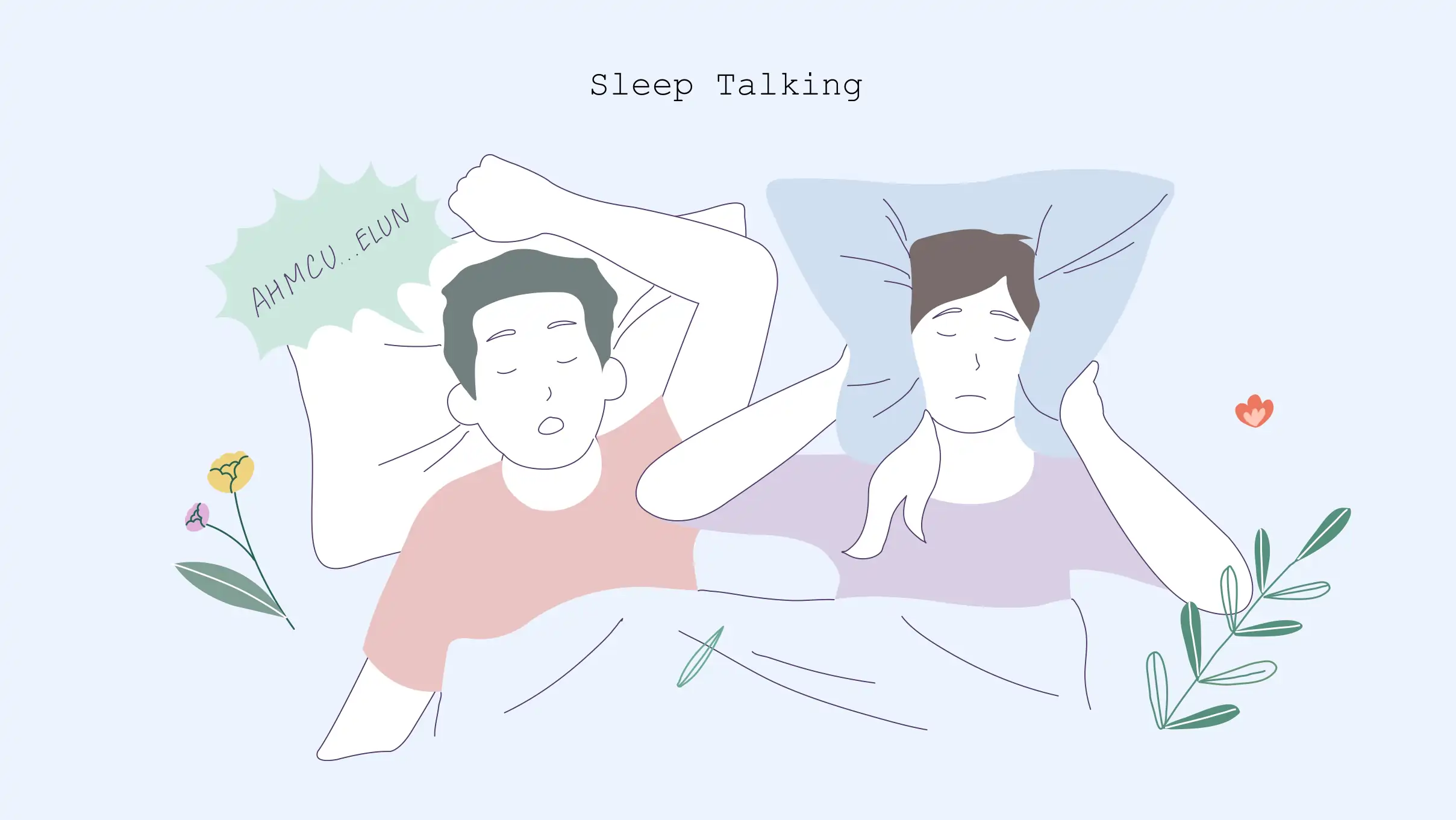Sleep Talking: Everything You Need To Know
Written by


Have you ever listened to a sleeping infant? Sometimes while sleeping, they mumble, make gibberish sounds, or start talking about their favourite games. Sleep talking is something we have all done once in our lives, mostly in our childhood.
Sleep talking means talking while you’re asleep without knowing what you’re saying. It is not a disease. But sometimes, it might also be a symptom of other sleep disorders, like insomnia or sleep apnea. Are you looking for an answer to the following questions:
- Why do I talk in my sleep?
- What does talking in your sleep mean?
If so, read the article carefully. This article will discuss the meaning, causes, side effects of sleep talking, and ways to stop talking in your sleep.
What Is Sleep Talking
Somniloquy, a scientific name for sleep talking, is parasomnia (an abnormal behaviour that a person does when asleep). It is a form of parasomnia in which a person talks unconsciously while sleeping. People talking in their sleep is rare; a study shows that only 5% of adults do so. The lifetime prevalence of talking in your sleep is 60% to 65%, as per the study. Talking in sleep occurs most frequently in childhood, affecting 50% of small children.
Symptoms of Sleep Talking
You cannot discover on your own that you talk in your sleep. Your sleep partner is the best person to tell that you are sleep-talking. The sole symptom of sleep talking is when someone lying next to you overhears you mumbling, crying, or talking in sleep. After hearing this, you can feel embarrassed, shocked, or surprised. Start finding answers to questions such as “Why am I talking in my sleep?” Why do people sleep talk? Is it an illness? How to stop sleep talking naturally?
What Does Research Say about Sleep Talking?
People mistakenly believe that talking in your sleep is solely related to your dreams. However, this is not true. According to research, sometimes there is a connection with your dreams. You can experience sleep talking at any stage of sleep. This includes both REM (rapid eye movement) and non-REM stages.
As a result of not realising the gravity of their words, the idle chatter people engage in while sleeping is not very important, harmful, and even boring. A linguistic study found that over 50% of sleep recordings are vague and that the sleep talking in these recordings consisted of muffling, mumbling, silent speaking (only the movement of the lips with shallow sound), etc. According to another study, sleep talking can become vulgar, violent, or offensive in a few cases. People shout out loud, cry, or sometimes start moving their hands or bodies due to their sleep talking. You may do romantic talking in your sleep or perform sexual activities while sleeping, known as sexsomnia.
Causes of Sleep Talking: Why Do People Talk in Their Sleep
Doctors and experts need help to discover the real causes of sleep talking. What causes sleep talking? Some scientific evidence has proven that such issues may run in families and have genetic effects. Sleep deprivation, fever, and high stress lead to talking in sleep. Other than all these reasons, studies show that mental health conditions are the major cause of sleep talking. These include:
- Post-traumatic stress disorder (PTSD)
- Sleep Apnea
- Dementia
- Emotional stress
Side Effects of Talking in Your Sleep
The majority of sleep talking is innocuous. However, sometimes it can become a significant problem for you or your companion. The following are side effects of talking in sleep:
- Because of your sleep talking, your partner’s sleep is ruined.
- It may indicate severe sleep disorders, including sleep apnea and REM sleep behaviour disorder.
- It gives rise to other parasomnias, such as confusional arousal and sleepwalking.
Sleep Talking Treatment
Only a few cases of sleep-talking require treatment. If you are an adult experiencing this for more than a few days or weeks, you should see a sleep specialist. A specialist or doctor is needed when you’re acting violently, shouting aloud while sleeping, or displaying great fear. If your sleep talking is disturbing your roommate, you should see a doctor for precautions and a healthy sleep environment. If you are worried that your child suffers from a severe sleep problem, you should visit a paediatrician.
No tests can prove that you do sleep talking. But if you think you have a severe sleep disorder, your doctor may suggest a sleep study or recording of your sleep (called a polysomnogram). Your sleep talk will decrease due to the precautions and recommendations provided by the doctor.
How to Stop Sleep Talking
There is no specific medication to treat sleep talking because it is not an illness. However, you can follow the below-mentioned steps to stop talking in sleep:
- First, ask yourself, “Why do I talk in my sleep?” And whether you experience it due to stress, a fever, or other mental health issues. Take proper medication, reduce your stress levels, or engage in meditation.
- Ensure your bedroom is conducive to good sleep, including a comfortable bed, dark curtains, room temperature, and dim lights that can provide better sleep.
- You must eat a light meal at night because it affects your sleep.
- Avoid consuming alcohol and caffeine before sleep.
- Prepare a proper sleep schedule and stick to it.
Conclusion
Sleep talking is normal, but you need to understand why I am talking in my sleep. If stress or fever is the cause, don’t panic; you’ll be fine in a few days. If you believe talking in your sleep is a sign of a severe sleep disorder, consult a doctor as soon as possible.
FAQs
Is it normal to talk in your sleep?
Conversing while you are asleep is known as sleep talking or somniloquy. It’s a form of parasomnia, which is when strange behaviour occurs while you’re sleeping. It happens frequently and is typically not seen as a medical issue.
Can sleep talking reveal secrets?
While it would make a great plot device for a TV drama, it is doubtful that secrets would be revealed through sleep talking. According to a study, there are better techniques to persuade someone to divulge their secrets!
What is sleeping talking?
Sleep talking also referred to as somniloquy, is characterised by unconscious babbling while sleeping. Sleep speech might consist of complex monologues, conversations, nonsense, or mumbling.
Can stress cause sleep talking?
Although it can happen to healthy people, sleep talk can also be caused by conditions including sleep apnea, night terrors, and persistent headaches. Nightmares and emotional stress can also bring it on.
How can I control my sleep talking?
There is currently no known method to stop sleep talking. You may be less prone to speak in your sleep if you avoid stress and get plenty of rest. Maintaining a sleep journal can assist in identifying your sleep habits and may assist your doctor in determining whether an underlying issue is to blame for your sleep talking.
people like this article
Written by






